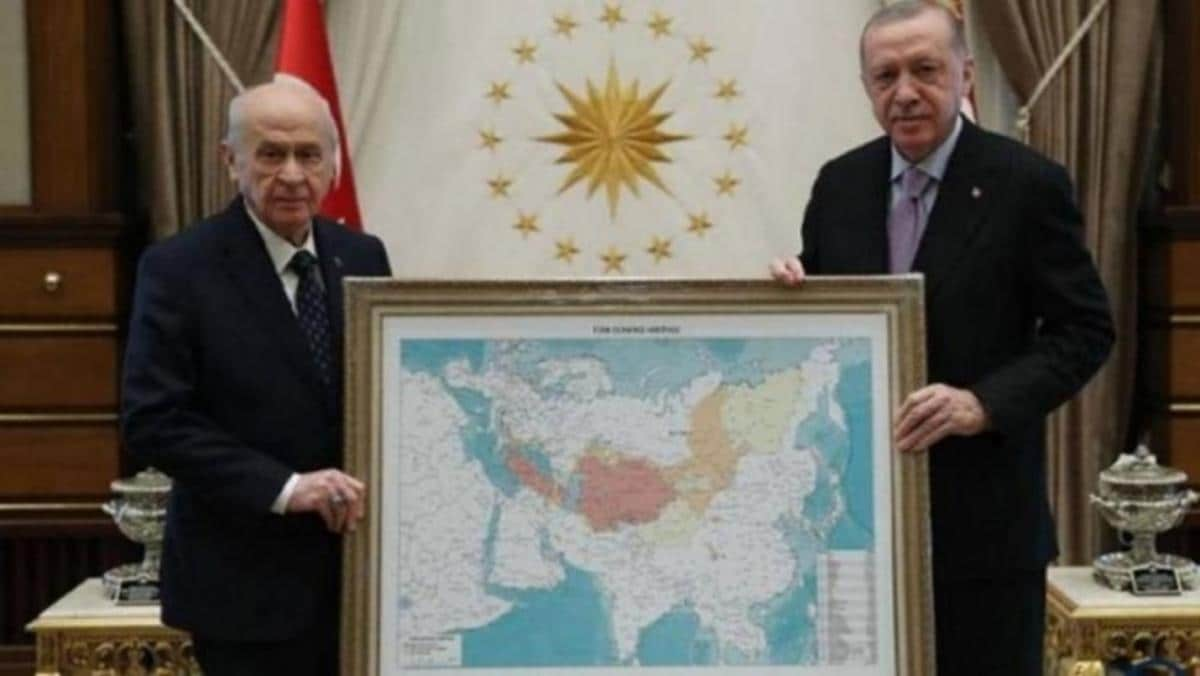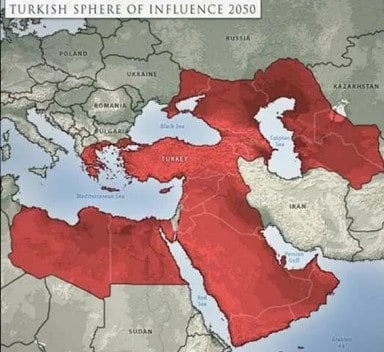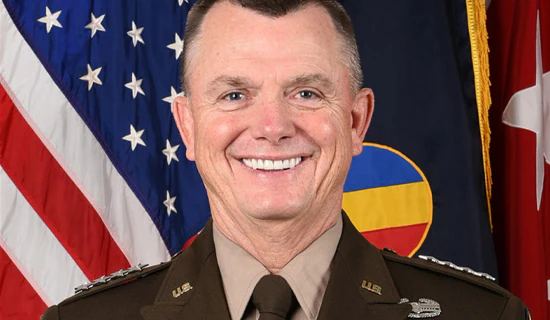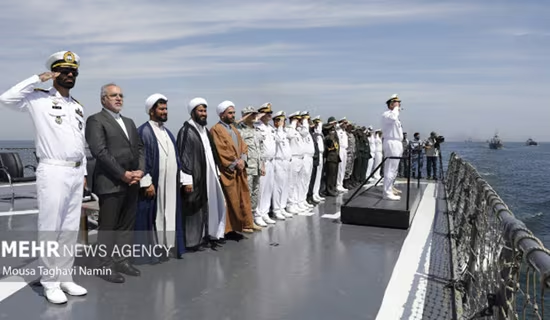According to Russian media outlet Bloknot, after the overthrow of the Assad regime in Syria, Turkish President Recep Tayyip Erdoğan is "convinced that the balance of power is on his side." Bloknot said that Erdoğan feels that Russia is weak and that his plan is now "to get the Caucasus, Crimea, Tatarstan, Astrakhan, Volgograd, Rostov, Saratov, Samara oblasts, Krasnodar Krai, and even part of Siberia," to establish the Grand Turan, i.e. the unification of the Turkic peoples under "the wing of the renewed Ottoman Empire."

In 2021, the head of the Turkish Milliyetçi Hareket Partisi (MHP), Devlet Bahçeli, presented a map of the "Turkic World," which included also Russian territories, to Turkish President Recep Tayyip Erdoğan.
Following is Bloknot's article:[1]
"Any Attempt To Realize [The Establishment Of The Great Turan] Would Mean Another Russo-Turkish War"
"[Erdoğan's] plan is to get the Caucasus, Crimea, Tatarstan, Astrakhan, Volgograd, Rostov, Saratov, Samara oblasts, Krasnodar Krai and even part of Siberia.[2]
"The victory in Syria and Russia's failure to protect the Assad regime encouraged Erdoğan. The main conclusion he has drawn from nearly three years of the SVO[3] and the expeditious fall of Damascus is that [the Russian] army is weak.
"Therefore, the head of Turkey not only insists on the return of the 'territory of Ukraine,' including Crimea,[4] but also makes plans for the establishment of the Grand Turan, or rather, for the unification of the Turkic peoples under the wing of the renewed Ottoman Empire.
"For now [Erdoğan speaks about it] informally, only among the 'inner circle,' but he openly says that the Caucasus, Crimea, Tatarstan, Astrakhan, Volgograd, Rostov, Saratov, Samara oblasts, Krasnodar, and Stavropol krais and even Siberia should become part of Turkey. In addition, [the country should include] Abkhazia, Azerbaijan, Armenia, Georgia, Kazakhstan, Kyrgyzstan, Uzbekistan, and Turkmenistan. Any attempt to realize these plans would mean another Russo-Turkish war.[5] But Erdoğan is convinced that the balance of power is on his side. After all, he plans to act, as he did in Syria, primarily via Islamic terrorists."
Erdoğan's Changing Rhetoric Against Russia
"The Turkish president's rhetoric has recently undergone big changes. Back in March of the last year, one of his election postulates was: 'We will not allow the West to drag Turkey into a war against Russia.'
"However, a year and a half has passed. Since then, the Ukrainian army has managed to seize part of the Kursk Oblast. The Ukrainian armed Forces launch strikes with NATO-made missiles and drones in the Caucasus, the Urals and the capital region. In response, our army demonstrates restraint and continues to emphasize victory on the battlefield. The Russian Armed Forces are advancing in Donbass, but the SVO pace is incomparable to the speed with which the terrorists, trained and supplied by Turkey, conducted their operation in Syria. And this has had an effect on Erdoğan. He, as they call it, believed in himself.
"And now a number of sources report that during a recent meeting with European Commission head Ursula von der Leyen, Erdoğan made a radical change in his rhetoric. For instance, he expressed confidence that the Russian army will withdraw from Syria by 2025, transferring its bases to local terrorists. (For now, by the way, our strongholds have been taken by American special forces). They also report that Erdoğan recalled [the incident] of 2015, when Turkey shot down our warplane, and said: that (as reported) it became the beginning of the end of Russian influence in the region. What is more, he allegedly told Ursula that the next couple of years will become for Russia 'a time to correct its mistakes.' [Media claim] that he said that the Russian Armed Forces will withdraw not only from Syria, but also from Ukraine.
"How come? [one might ask] – It turns out, [that Moscow will do it] in order to 'focus on internal problems.' If so, what upcoming 'internal problems' of Russia that need to be dealt with the help of the armed forces does Erdoğan know about? The answer is obvious: he is talking about an upcoming attempt to launch a large-scale terrorist attack on our statehood. Even potential opponents are already known – radicalized migrants from Central Asia. For now, they are still in Syria, but in their videos, they promise to soon start 'working' on the territory of the Russian Federation, in particular in the Caucasus."
Erdoğan "Said That Turkey Will Facilitate The Construction Of Gas Pipelines From Qatar And Saudi Arabia To Europe"
"The probability of such a scenario is extremely high. Considering the number of [labor] immigrants in Russia (about 15 million people), even one percent of this number can compose a real army, and it will not be possible to deal with it using only the FSB and the Rosgvardia,[6] without the help of the Russian Armed Forces. Moreover, the enemies of our country will no doubt try to attract into their ranks not only convinced Islamists, but also those who are ready to kill Russians simply for money. As the events at Crocus[7] or the murder of General [Igor] Kirillov demonstrate,[8] those willing to make money from such things can be found.
"Our special services are well aware of all this. What is frightening about the situation is that Erdoğan is aware of the terms for the coming problems for Russia. Which makes one think: is it not Turkey itself stands behind the backs of Islamic radicals? Is it not its plans to launch a terrorist war in the Caucasus?
"In order for the West not to interfere, or perhaps even to support such a scenario, Erdoğan threw a 'bone' through Ursula von der Leyen: he said that Turkey will facilitate the construction of gas pipelines from Qatar and Saudi Arabia to Europe. Officially, this [would happen] to provide Syria with energy sources and jobs. However, it is obvious that the strategic goal is different – to minimize as much as possible EU's dependence on Russian energy supplies.
"After all, by and large, the West has only two fears about a possible war on the Russian territory. The first is who, in the scenario of the collapse of our country [Russia], will get nuclear arms. And the second one is whether the hostilities will lead to a cease of energy supplies. The new gas pipelines that will go through Turkey practically solve the second problem.
"In response, Ursula von der Leyen announced a new €1 billion aid package to Turkey to support the millions of Syrian refugees living in the country, basically saying: thank you, we are in favor!
"Turkey Will Deliver Its Main Blow [To Russia] Only When It Will Be Sure Of Success"
"At the background of Erdoğan's statements in the field of the European diplomacy, there are other unpleasant signals of a sharp change in the Turkish [political] course. For instance, the foreign minister of this country, Hakan Fidan, has purportedly already twice refused a personal meeting with Sergei Lavrov. Our foreign minister requested a meeting after Fidan, while giving a speech in Doha, proclaimed that 'Russia will lose Syria, as happened with Karabakh, and will also lose Ukraine within the next two years.'[9] After these words Lavrov attempted to hold a personal meeting to seek clarification, but sources report that he received a diplomatic refusal.
Instead, Turkey has announced a possible increase by 25 percent in the cost of servicing Russian aircraft at its airports starting from January 1, 2025, as well as the need to increase transit tariffs for cargo traveling through Turkish territory by 40 percent. All of these could deliver a serious blow to our economy, for which Turkey serves as one of the main 'hubs' for the supply of sanctioned products.
"Nevertheless, so far, it is all just a process of preparation 'on the distant footholds' of steps towards the gradual weakening of Russia. Turkey will deliver its main blow only when it will be sure of success. For instance, after the Islamist underground tries to start a war within our country, at that moment the Turkish army can either 'for humanitarian reasons' try to enter the Caucasus, or to land in Crimea in order to 'restore historical justice.'"
"The U.S. Will Be Rooting For Turkey"
"It should be well understood that if Turkey encroaches on our territories, the so-called 'world community' represented by the West will not condemn it. Let us note that when Russia annexes Crimea based on the results of a general referendum, it is dubbed an 'occupation,' as well as the decision of the peoples of Donbass, Zaporozhye, and Kherson [oblasts of Ukraine] to become part of Russia. In turn, when Israel seizes the Golan Heights, it is dubbed a 'necessary security measure,' and 'creating a buffer zone against terrorism.' When Erdoğan talks about revising the outcome of World War I and annexing five Syrian governorates – Aleppo, Idlib, Hama, Damascus, Raqqa – it is a 'disputed historical issue.' Double standards are the reality of modern policy of the West, the main goal of which is the destruction of Russia. Therefore, no one will condemn any actions in this regard.
"Will the U.S. or NATO support such plans? – It is unlikely, militarily. Trump is well aware that Turkey is his main rival [for a title of] 'hegemon' in the Middle East. Israel is also aware of the fact that if the Ottoman Empire is revived, they will not be allowed to survive as a state. Thus, if Russia and Turkey will engage in hostilities, it is almost guaranteed we will be fighting one-on-one. Almost... It is already clear that Azerbaijan will be Erdoğan's ally in case of a large-scale campaign.
"Nevertheless, the U.S. will be rooting for Turkey. In 2021, the CIA published a map of this country with the borders of the year 2050. And it depicts almost the same Grand Turan, in addition including Greece.

The Bloknot article refers to the above map. As reported by the Armenian weekly: "Stratfor is an intelligence-based 'research center' often described as the 'shadow CIA' whose advisory is to sell intelligence. Its founder George Friedman published a book in 2009 titled 'The Next 100 Years: A Forecast for the 21st Century,' which is based on predictions of how the geo-political map of the world will look in 2050. In one of its chapters, the book has published a map of 'Turkey's sphere of influence in 2050.' According to the map, Turkey's sphere of influence by 2050 will include Greece, Cyprus, Libya, Egypt, Syria, Iraq, Lebanon, Jordan, Saudi Arabia, Oman, Yemen, Gulf countries, Georgia, Armenia, Azerbaijan, Crimea, Turkmenistan and Kazakhstan. The book was published during a period when Turkey's foreign policy under former Foreign Minister Ahmad Davutoğlu was being shaped based on the so-called 'zero-problem' foreign policy which aimed to ease tensions in neighboring countries starting from the signing of the Armenian-Turkish protocols and ending with consolidating 'friendly' relations with Arab countries. During this era, many researchers criticized Turkey's foreign policy and categorized it as 'neo-Ottoman'... Almost 12 years later [in 2021], this map is recirculating, but this time it is being republished by Turkish media channels... Apparently, showing this old map on national TV was meant to serve the ongoing 'neo-Ottoman' and 'Pan-Turkic' aspirations of the ruling party in Turkey." (Source: Armenianweekly.com, March 3, 2021)
"The last time we fought Turkey was during WWI. We were allied with England and France; the Ottomans, with the Germans and Austria-Hungary. At the end of 1914, the Turks launched an offensive. There were two major battles, both of which [the Russian Empire] won. By the start of 1917, Russian troops advanced deep into the territory of Ottoman Empire, seizing the most important and largest cities – Van, Erzurum, Trabzon, Muş, and Erzincan. Hostilities were also happening on Persian territory, from which our army pushed out the Turks. But after the revolution in Russia, the Transcaucasian Commissariat could not hold the borders, and Turkish and allied German troops occupied a part of Transcaucasia. Wherein, Turkey signed a peace treaty with Armenia.
"After Germany's defeat in World War I, Transcaucasia was occupied by the Entente. The Ottoman Empire practically collapsed.
"After the civil war in Russia and the Turkey's war for independence, in 1921 the Treaty of Moscow was signed between the Russian Soviet Federative Socialist Republic (RSFSR) and Turkey, according to which the cities of Kars, Ardahan, [and] the Surmalu region with Mount Ararat were ceded to Turkey."
[1] Bloknot-kamyshin.ru/news/rossiya-sleduyushchaya-posle-sirii-erdogan-polozhi-1807379, December 10, 2024. The article was written by Alexander Pylev.
[2] "Caucasus, Crimea, Tatarstan, Astrakhan, Volgograd, Rostov, Saratov, Samara oblast, Krasnodar Krai and even part of Siberia" are the names for geographical regions and/or constituent entities of Russia.
[3] SVO – Special Military Operation in Ukraine, the official Russian term for the war in Ukraine.
[4] "Türkiye supports the territorial integrity and sovereignty of Ukraine. Ankara also backs the return of occupied territories, including Crimea, according to the chief adviser to the president of Türkiye, Yalcin Topcu." Newsukraine.rbc.ua/news/erdogan-says-t-rkiye-supports-return-of-ukrainian-1728456688.html, October 9, 2024.
[5] Russo-Turkish wars – a term for the series of conflicts between the Russian and Ottoman empires, of which there were 12 between the 16th and 20th centuries.
[6] Rosgvardia (National Guard of the Russian Federation) are internal militarized forces in Russia.
[7] The March 22, 2024 terrorist attack in the Crocus City Hall venue in Moscow.
[8] Bbc.com/news/articles/cm2ek388yxzo, December 17, 2024.
[9] In mid-December it was reported that Russian telegram channel Nezigar claimed that Turkish Foreign Minister Hakan Fidan in Doha said, "Russia will lose Syria, as happened with Karabakh, and will also lose Ukraine within the next two years." X.com/AliTahmizian/status/1869756674308985281, December 19, 2024.




